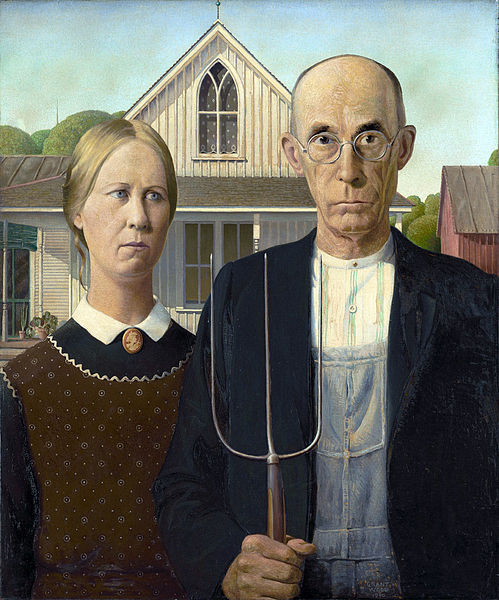Public Domain Day is the first day of the year, every year. In Europe, Jan 1, 2013 is the day when hundreds of works are entering the public domain. Works including Grant Wood’s European Gothic, works by Edith Stein, Bruno Schulz and Franz Boas. Now, in the EU citizens can copy, share, or incorporate these works into digital archives at libraries, public or private. Artists can make versions of “European Gothic,” without asking permission or violating the law.
January 1 is Public Domain Day, celebrating the copyrights expiring. Films, photos, books, symphonies, paintings, and designs whose copyright term ends become free to air for the common use. I’m not trying to say copyrights are a bad thing – far from it – they give authors, musicians, artists, designers exclusive rights over their works so they can actually make a little coin. That way creators can create and publishers can distribute and they can all eat. However, when the copyright ends, and the a creator’s work enters the collective culture along the lines of Shakespeare, Beethoven, Sir Arthur Conan Doyle, that’s pretty awesome too. Not to mention new people can legally build on what has come before.
So what do you get in the United States? Not a Damn Thing. Not a single published work will enter the public domain this year, next year, or the following year. Due to the extension of copyright laws, nothing will enter the public domain in the US until 2019. Even worse, in 2012 our great Supreme Court rules that Congress can take works BACK from the public domain. In theory, it would be possible for Congress to pull Socrates, Dickens or Mozart protected under copyright law again.
The first copyright law in the US lasted for 14 years, then if it’s still viable the creator could renew for another 14 years if they wished. Our founding fathers could look at the federalist papers and expect them to be available to to the public in a couple decades. Our current laws allow copyright to last for the author’s life time plus seventy years. If the item is owned by a company, the copyright lasts for 95 years. Also, if an author does nothing, a creative work is still copyrighted and anyone looking to use it for any sort of commercial gain or expansion of the current work must follow correct licensing agreements and quite a bit of red tape that is difficult to navigate. One of the biggest problems is that they impose serious costs on libraries and archives, on education, and on creatives.
The pre-1978 copyright law said that a work would be under copyright for 28 years, and could then be renewed by the creator for another 28 years if they so desired. According to the Copyright Office 85% of creators did not renew their copyrights. For books 93% of authors did not renew. This is because most works fall out of the commercial eye pretty quickly. According to the Duke Law Society, there was a congressional research study that found only 2% of works between 55 and 75 years old retain commercial value in any way shape or form. Even if everyone took the full 56 years from 1956 of copyright 98% of them would not be making any copyright holder any fiscal gain. No one is benefiting 98% of works being held under copyright in the United States. Everyone is being hurt while the works remain commercially and culturally off limits. The US public loses any possibility of meaningful access for diddly squat.
Here’s a list of famous works that should have been “free as the air to common use.”
Note these are all extremely famous works to drive the point home, there are literally thousands of other works that are being lost because they are 56 years old and no one will see them over the next few decades to remember to record.
Books
- A History of the English Speaking Peoples, Vol 1 and Vol 2 – Winston Churchill
- Minority Report – Philip K. Dick
- Diamonds are Forever – Ian Fleming
- Old Yeller – Fred Gibson
- My Fair Lady – Alan Learner
- Long Day’s Journey into Night – Eugene O’Neill
- 101 Dalmations – Dodie Smith
- The first issue of MAD magazine
Movies
- Around the World in 80 Days
- War and Peace
- Forbidden Planet
- Invasion of the Body Snatchers
- The King and I
- The Man Who Knew Too Much (Hitchcock’s 1956 remake of his 1934 film)
- Moby Dick
- The Searchers
- The Ten Commandments
Music
- Let the Good Times Roll
- Who Do You Love
- I Walk the Line
- Heartbreak Hotel
- Don’t Be Cruel
- Love Me Tender
Scientific Studies
- Three Models for the Description of Language – Noam Chomsky
- On the Origin of Cancer Cells – Dr. Otto Warburg
- The Logic Theory Machine – A Complex Information Processing System – Newll and Simon
- Model Psychoses Indused by LDS-25 in Normals – The JAMA Network
- General Systems Theory – the Skeleton of Science – Kenneth Boulding
I provided links to the original content wherever possible, note that the hardest to find are the scientific papers. Some have been available through altruistic means and methods, but that is arguably one of the greatest losses.
Sources
